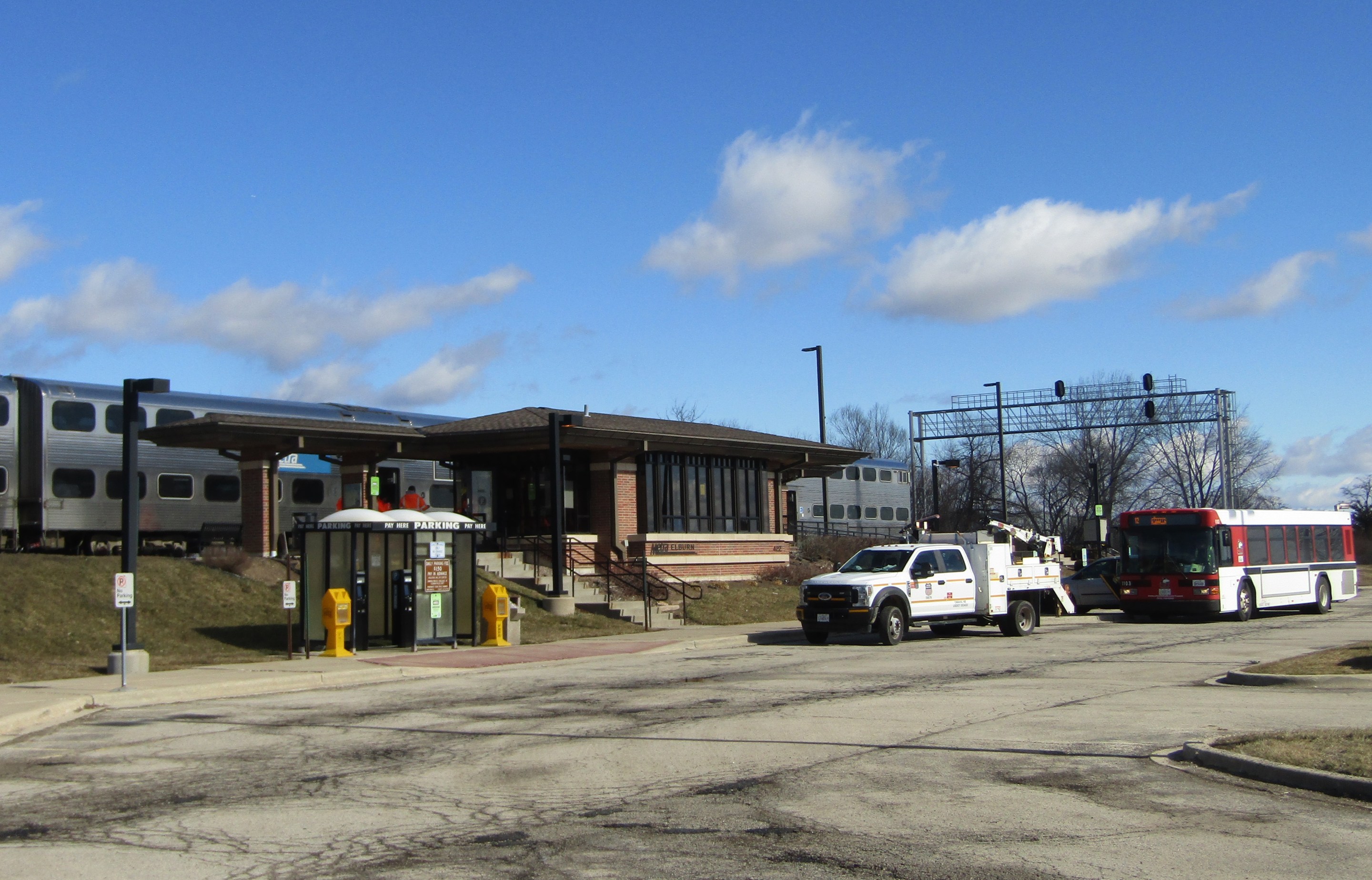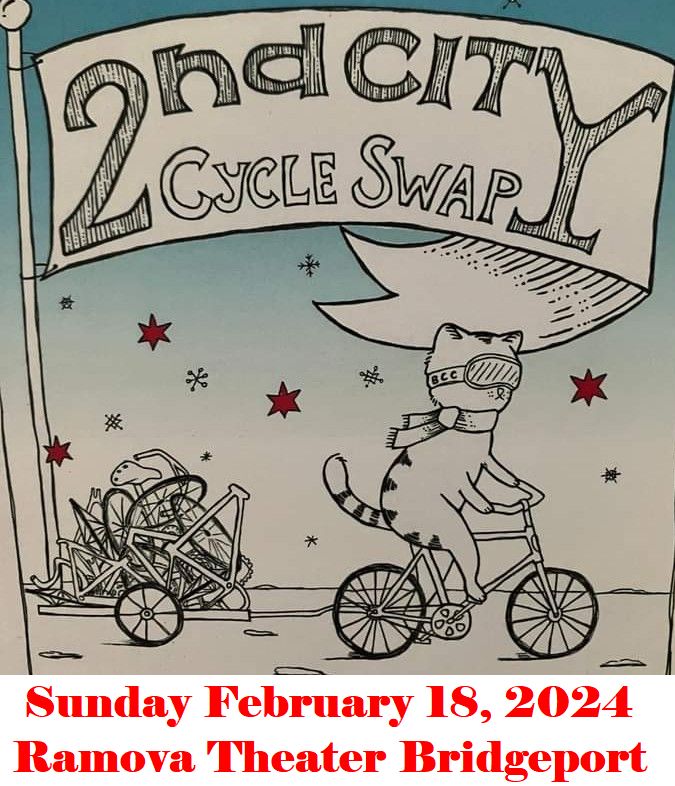
The motto "If you build it, they will come" seems to have really paid off for a bus route connecting Metra's Elburn Union Pacific West line station and Northern Illinois University in DeKalb.
At the start of 2023, DeKalb Transit's Route 12 - Elburn Shuttle ridership noticeably increased compared to pre-pandemic numbers. But that was nothing compared to the spike in ridership at the start of last August, when the ridership surpassed the 2,000 a month mark for the first time in the route’s history. While it didn’t quite stay that high, when comparing ridership by month, it was still far above any other ridership records the route has experienced over the past four years.
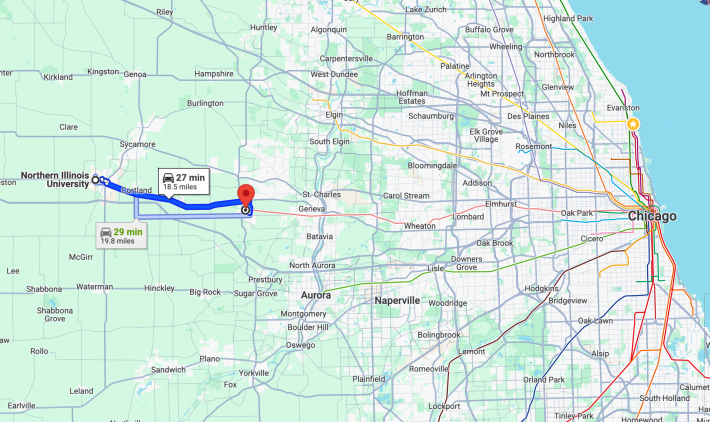
Mike Neuenkirchen, the city’s transit manager, said the reason for the ridership spike is simple. Since the start of 2023, riders could pay regular, 50-cent fares instead of the $8 premium fares, and service has increased. As NIU’s fall semester got underway, DeKalb Transit increased the service even more, to the point where it became very practical for commuters traveling to the western suburbs and the city of Chicago.
All this has been happening as DeKalb continues lobbying Metra and the Illinois Department of Transportation to extend the UP-W line to the college town. This is something DeKalb has been working toward for decades, and the conversations are still in early stages. But the ridership spike that happened when the Elburn Shuttle got more Metra-like frequencies may be the strongest evidence yet that there's demand for train service.
Frequency and Ridership
DeKalb hasn’t had any passenger rail service since April 1971, when Amtrak took over most intercity passenger service and decided not to continue the few trains that still served the city.
Until 2019, DeKalb had two bus systems: NIU’s Huskie Line routes and TransVAC routes operated by the Voluntary Action Center. At the time, Elburn Shuttle was exclusively geared toward NIU students who wanted to go home for the weekend. The buses went to the Elburn Metra station on Fridays and picked students up from the station on Sundays.
In 2018, DeKalb started combining the two systems, creating a unified number scheme, fares and transfers. Neuenkirchen said that that made sense, not just to make the service easier to use and expand, but because it would make all routes serving DeKalb eligible for state and federal funding. That process was completed in 2019.
This was when Route 12 started running all week. However the service outside Fridays and Sundays was still limited. Three buses traveled in each direction from Monday to Thursday, and two buses ran on Saturdays. Huskie Line routes have always been free for NIU students, faculty and staff, but non-student riders of the expanded Route 12 had to pay $8. Neuenkirchen said that, at the time, they weren’t sure how much state and federal funding they were going to get, so they worked with the available funding at the time.
The expanded service did seem to pay off in the long run. The number of passengers was growing, and ridership for January and February 2020 more than doubled the equivalent 2019 figures. The pandemic derailed that progress, and the city suspending fare collection all the way until July 1, 2022 didn’t seem to make much difference. In 2022 the route started seeing notable improvements compared to pre-pandemic numbers, at least when NIU was in session.
"Frequency was a real barrier," Neuenkirchen reflected. "Just running it a couple of times a day, it wasn't really convenient for the public."
Towards a more convenient service
By 2023, the city was getting regular federal and state funding for transit. This, along with rider feedback, convinced DeKalb Transit to switch to regular fares and increase weekday service frequency to eight trips.
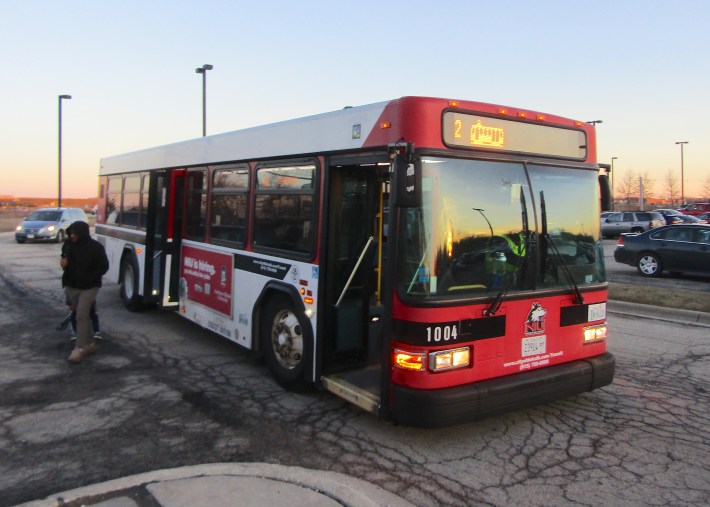
The effect on the ridership was immediate. January is usually a slower month for the route, because NIU spring semester doesn’t start until after Martin Luther King Jr. Day. But January 2023 ridership more than doubled compared to 2022, going from 175 riders to 375 riders. The increases continued through the year. In April the ridership broke the 1,000-rider mark for the first time, going from 376 in 2022 to 1,027 in 2023.
The current schedule took effect on August 28. The bus now makes 13 trips a day on weekdays, adding early morning and late-night options. There are still only two buses in each direction on Saturday, but there are five buses in each direction on Sundays. When NIU is on break, the weekday frequency drops to eight buses in each direction, and weekend frequency drops to two in each direction.
The increase in September, the first full month of the current schedule, shattered the previous highs, going from 522 in 2022 to 2,023 – a nearly eight-fold increase. October was the highest-ridership month yet at 2,803 riders (versus 607 riders in 2022), and while the numbers dropped, they remain several times the 2022 figures. 2024 is on track to continue the trend – the January ridership was 1,421 riders.
"It has been incredibly successful,” Neuenkirchen said. “The route has really grown." He added that before 2023, NIU students accounted for around 90 percent of the route ridership. They still make up about two-thirds of all riders, and the general public accounts for about a third.
“We’re getting feedback from individuals who are saying, yeah, we’re starting to use the bus on a regular basis to go to work, to go to Chicago or the west suburbs, because we increased the frequency," Neuenkirchen said. "It's a lot more frequent and a lot more affordable."
Riding and long-term prospects
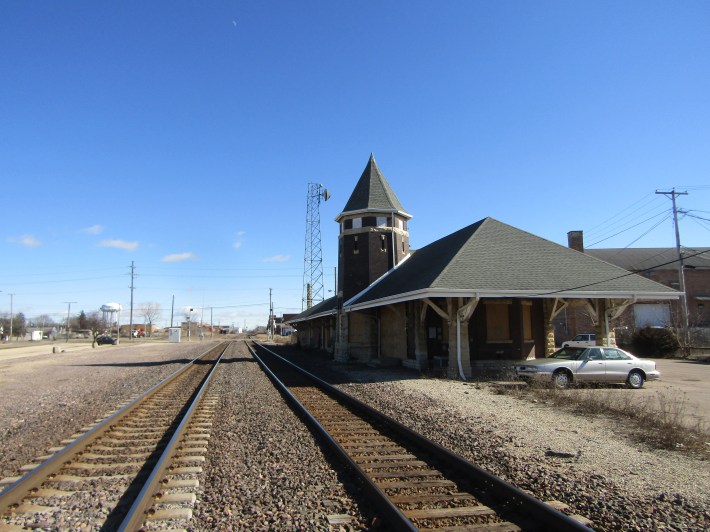
Unsurprisingly, the bus schedules are timed to coincide with Metra train arrivals. Route 12 goes express from Elburn to Pleasant Street and 9th Street, near downtown DeKalb, close to the historic Chicago & North Western Railroad station, 200 N. 6th St. (And the station is only four blocks east of the groovy Egyptian Theater, 135 N. 2nd St., opened in 1929.)
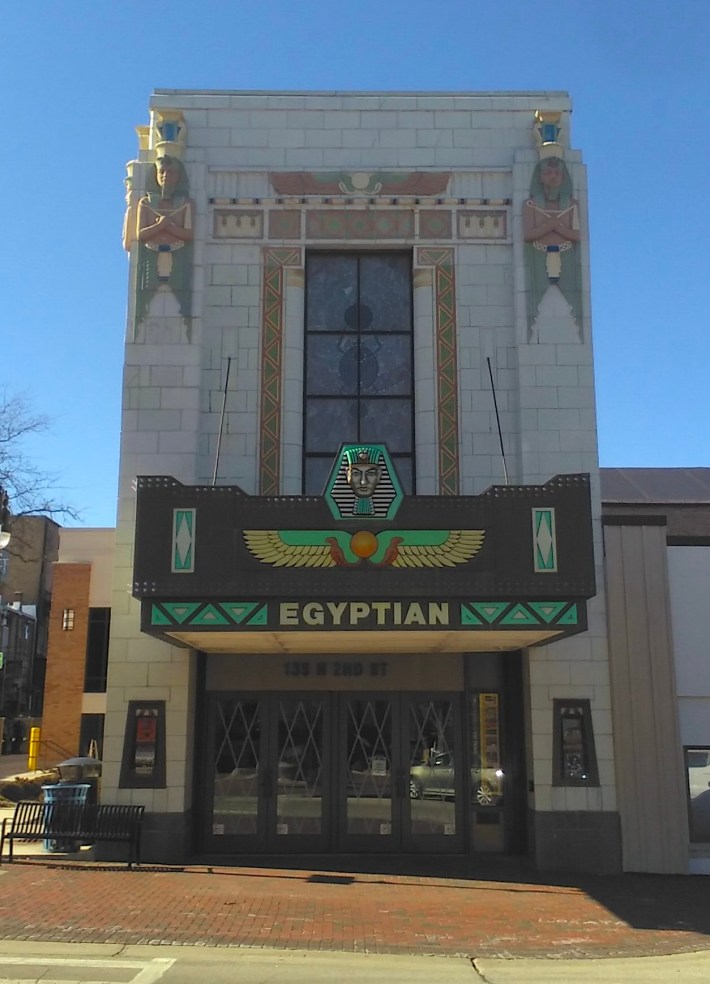
The shuttle makes a few more stops in the city before arriving at the heart of NIU. What I saw on the buses reflected what Neuenkirchen told me – many riders were clearly students. But I also saw a family of three take the afternoon shuttle bus to catch the Metra train to Geneva.
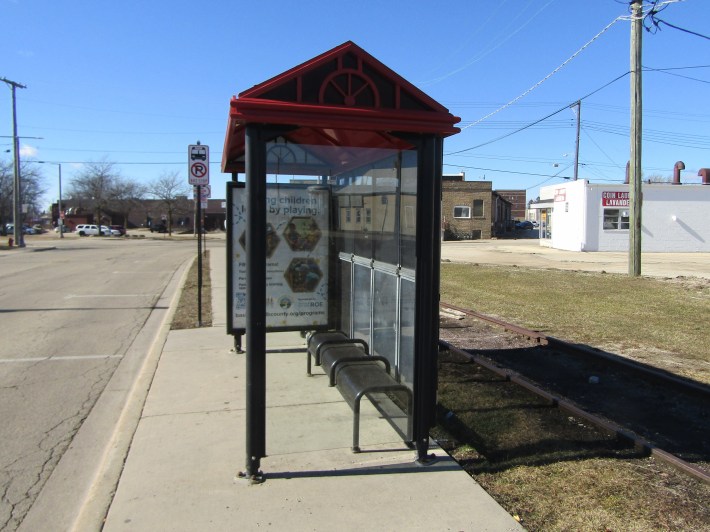
If the bus system has any issues, it’s the lack of signage. DeKalb Transit has nice-looking bus shelters, but they don’t have any kind of signs showing bus route numbers or other travel information. At the stops without shelters, the closest thing to signage is "No parking, bus only" signs, which don’t really tell you which buses stop there.
At the Elburn Metra station, the buses drop off passengers near the platform and then pull up to the boarding area at the parking lot a bit further south. But you wouldn’t know it unless you see the bus pull into the station – and it’s not really clear where you’re supposed to wait for it.
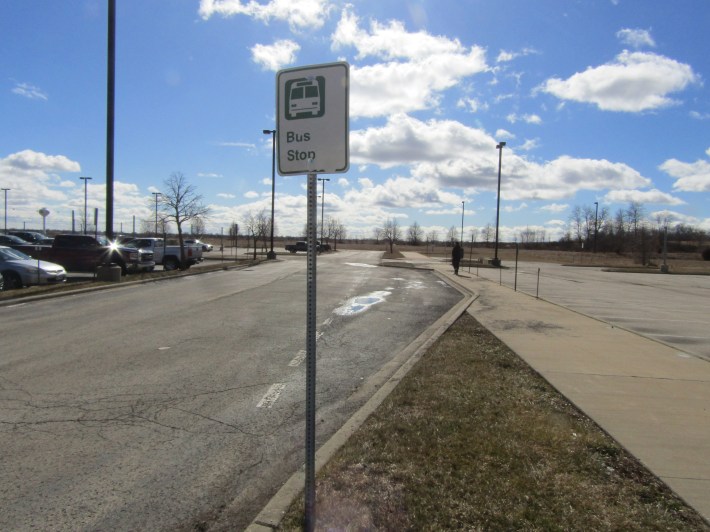
Neuenkirchen said that bringing the train to DeKalb is still a long-term goal. DeKalb County isn’t part of the service area for the Regional Transportation Authority, the agency that oversees the three Chicagoland transit systems. Metra has been reluctant to expand service beyond the RTA zone, stating that it would rather focus on improving service that already exists. Recently announced Metra service to Rockford would be an exception to that rule. But for that project, the construction and early operation costs will be covered through grants, and the Illinois Department of Transportation will subsidize operations the way it helps pay for state-run Amtrak routes serving Illinois.
Neuenkirchen said he sees Rockford’s effort to bring back rail as an inspiration. It took over two decades of advocacy, but it looks likely that the Metra service to the Screw Capital of the World will become a reality.
"That was a very long-term process," Neuenkirchen said. "I'm sure there are a lot of people saying – what’s the point of [trying to bring rail to DeKalb] – that won't happen. But look at [Rockford’s] journey."

Did you appreciate this post? Please consider making a tax-deductible donation to help Streetsblog Chicago keep publishing through 2025. Thank you.
